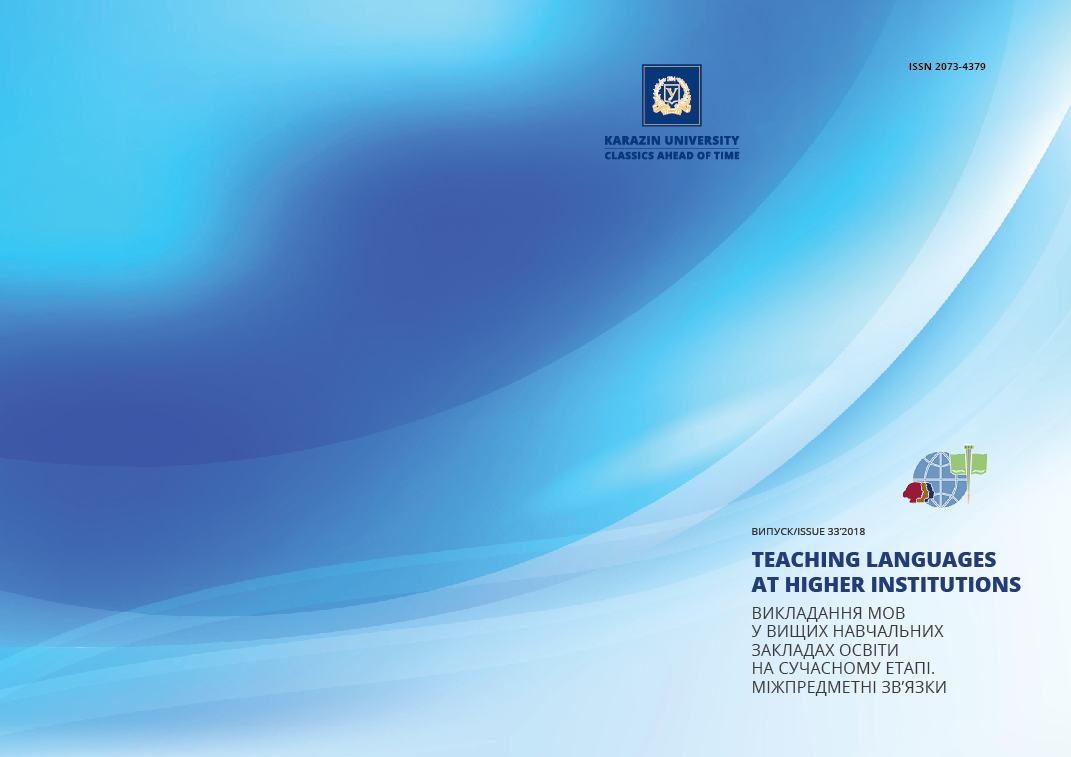The philosophical foundations of the modern competence linguodidactic paradigm
Abstract
The article focuses on the necessity of updating the model of a modern linguodidactic paradigm based on the newest philosophy of education which is the theoretical basis of the methodology of teaching Ukrainian as a foreign language. The relevance of the proposed article is due to the focus of the national strategy for the development of education in Ukraine, in particular, the education of foreign students, which is one of the important factors for the formation of the Ukrainian state as an equal partner in creating the global educational space. Modern trends of post-non-classical educational philosophy have been described by the author, such as a renewed vision of the content and results of education, updated with new requirements of a real changing globalized society. The creation of a global general educational, the introduction of a credit transfer system of training requires standardization of educational results. The formed set of competences of the future specialist, caused the need for the personality to be prepared for life in the modern unstable world and producing the competence-based nature of the modern educational paradigm, have been recognized as such a result. The reference point on the formation of competence is the basis for the most complete expression of the installation on the design of education as a social activity, leading to the development of the individuality of a person in the world that is constantly changing.
Approaches to the definition of the phenomenon of competence have been analyzed in the article. The mastering of the target language takes place in the process of language education, the result of which develops a communicative competence, which has taken the leading place in the set of competencies of a university graduate at the present stage. The classic definition of a communicative competence also needs to be updated by the way of basing on the latest philosophical researches.
The author makes a conclusion about such characteristic features of the modern competence paradigm of education: communicative rationality of the content of the educational process; the pluralism of ways of comprehending knowledge and ways of familiarizing oneself with a culture as an extensive open model of the world that is constantly changing; orientation of the educational process on the result as a set of qualities of the established personality, containing constant and variable components.
Downloads
References
Andrushhenko, V.P. (2002). Osvita Ukrajiny v konteksti suspilnyh problem ta superechnostej. [Education of Ukraine in the context of social problems and contradictions]. Rozvytok pedagogichnoji i psyhologichnoji nauk v Ukrajini 1992–2002 [Development of pedagogical and psychological sciences in Ukraine 1992-2002]. Kharkiv. Vol. 2, pp. 3–16 [in Ukrainian].
Bacevych, F.S. (2004). Osnovy komunikatyvnoji lingvistyky [Basics of communicative linguistics]. Kyiv [in Ukrainian].
Borylko, E.V. Formy znanija i obrazovanije: aktualnost koncepcii M. Shelera. [Forms of knowledge and education: the relevance of the concept of M. Scheler]. Available at: http://bibliofond.ru/download_ (Accessed 17 Sep. 2018) [in Russian].
Gadamer, G.-G. (2000). Istyna i metod. Osnovy filosofskoji germenevtyky [Truth and Method. Fundamentals of philosophical hermeneutics]. Kyiv. Vol. 1 [in Ukrainian].
Gromyko, N.V. (2002). Internet i postmodernizm – ih znachenija dlja sovremennogo obrazovanija. [Internet and postmodernism – their implications for modern education]. Voprosy filosofii [Philosophy issues], 2, pp. 175–180 [in Russian].
Gusserl, Je. (2004). Krizis evropejskih nauk i transcendentalnaja fenomenologija [The crisis of European sciences and transcendental phenomenology]. St. Petersburg [in Russian].
Habermas, Ju. (2003). Filosofskij diskurs o moderne [Philosophical discourse about modern]. (M.M. Beliaev, Trans.). Moscow [in Russian].
Hutorskoj, A.V. (2003). Kljuchevye kompetencii kak komponent lichnostno orientirovannoj paradigmy [Key competencies as a component of the personality-oriented paradigm]. Narodnoe obrazovanie [Folk education], 2, pp. 58–64 [in Russian].
Kant, I. (2004). Krytyka praktychnogo rozumu [Criticism of practical mind]. (I. Burkovskyi, Trans.). Kyiv [in Ukrainian].
Klochko, V.E. (2005). Samorealizacija v psihologicheskih sistemah: problemy stanovlenija mentalnogo prostranstva lichnosti. [Self-realization in psychological systems: problems of formation mental space of personality]. Tomsk [in Russian].
McClelland, D.C. (1998). Identifying competencies with behavioral-event interviews. Psychological Science, 9, pp. 331–339 [in English].
Nacionalna strategija rozvytku osvity v Ukrajini na 2012–2021 roky [National Strategy for the Development of Education in Ukraine for 2012 – 2021]. Available at: http://www.meduniv.lviv.ua/files/info/nats_ strategia.pdf [Accessed: 06 Sep. 2016] [in Ukrainian].
Nikitin, V. Globalne ta zdatnist do transformaciji, abo u chomu my povynni zminytysja? [Global and the ability to transform, or what should we change?] Den. 26.01.2002 [Day. 01.26.2002]. Available at: https://day.kyiv.ua/ uk/article/poshta-dnya/globalne-ta-zdatnist-do-transformaciyi [Accessed 27 Aug. 2018] [in Ukrainian].
Proekt standartu ukrajinskoji movy jak inozemnoji [Draft standard of the Ukrainian as a foreign language]. Available at: https://mon.gov.ua/ua/news/ mon - proponuye-do - gromadskogo - obgovorennya - derzhavnij - standart- z-ukrayinskoyi-movi-yak-inozemnoyi [Accessed 27 July 2018] [in Ukrainian].
Rodermel, T.A. (2012). Fenomen kompetentnosti v sovremennom obrazovanii: socio-kulturnyj aspekt. [The phenomenon of competence in modern education: the socio-cultural aspect]. Tomsk [in Russian].
Selevko, G. (2004). Kompetentnosti i ih klassifikacija [Competences and their classification]. Narodnoe obrazovanie [Folk education]. 4, pp. 138–143 [in Russian].
Sheler, M. Formy znanija i obrazovanija [Forms of knowledge and education]. Izbrannye proizvedenija [Selected Works]. A.V. Denezhkyn, A.N. Malynkyn and A.V. Fylyppov (Trans.). Moscow, pp. 15–56. Available at: http://platonanet.org.ua/load/knigi_po_filosofii/antropologija/sheler_m_izbrannye_proizvedenija/5-1-0-883 [Accessed 02 Sep. 2018] [in Russian].
Ushakova, N.I., Dubichinskyj, V.V. and Trostynska, O.M. Koncepciya movnoyi osvity inozemciv u vyshhyh navchalnyh zakladah Ukrajiny [Concepts of language education in higher education institutions of Ukraine]. Available at: www-center.univer.kharkov.ua/vestnik/full/261.pdf [Accessed 20 May 2016] [in Ukrainian].
Ushakova, N.I. (2009). Uchebnik po jazyku obuchenija dlja inostrannyh studentov v rusle sovremennoj obrazovatelnoj paradigmy (Teorija i praktika sozdanija uchebnika dlja inostrannyh studentov vuzov Ukrainy) [Textbook on the language of instruction for foreign students in line with the modern educational paradigm (Theory and Practice of Creating a Textbook for Foreign Students of Ukrainian Universities)]. Kharkiv [in Russian].
Ushakova, N.I. and Kushnir, I.N. (2014). Sociokulturnaja sostavljajushhaja obuchenija russkomu jazyku inostrannyh studentov ukrainskih vuzov [Socio-cultural component of teaching Russian to foreign students of Ukrainian universities]. Prepodavanie russkogo jazyka inostrannym studentam: teorija i praktika, tradicii i innovacii [Teaching Russian to foreign students: theory and practice, traditions and innovations]. N.I. Ushakova (Ed.). Kharkiv, pp. 167–187 [in Russian].

